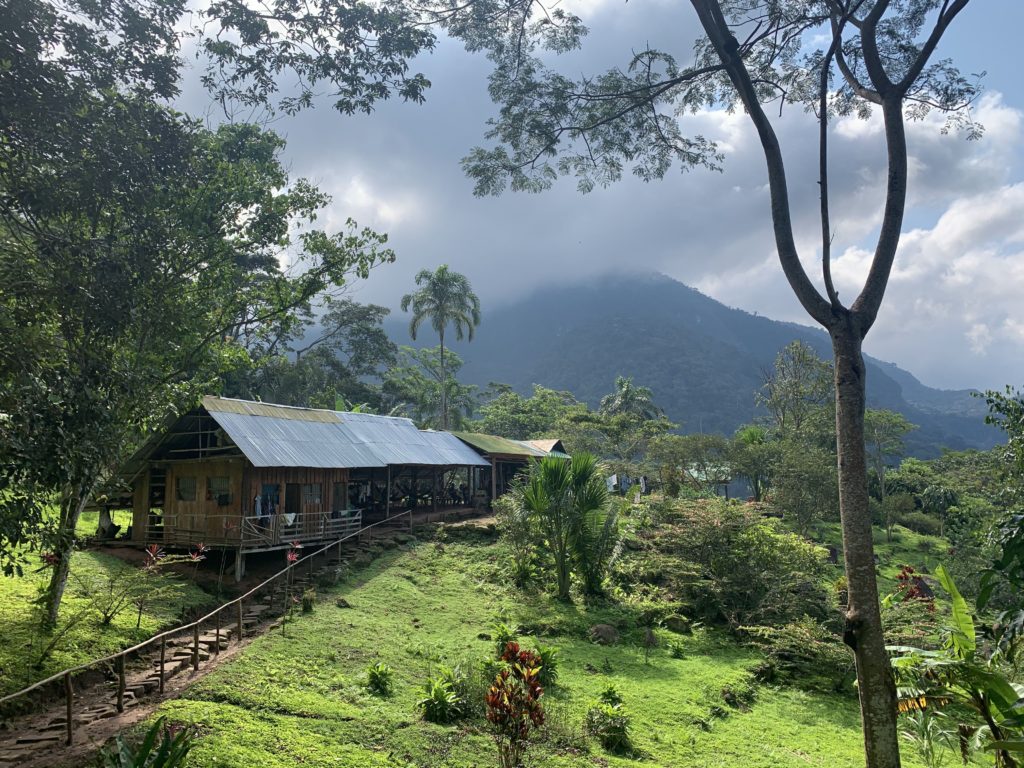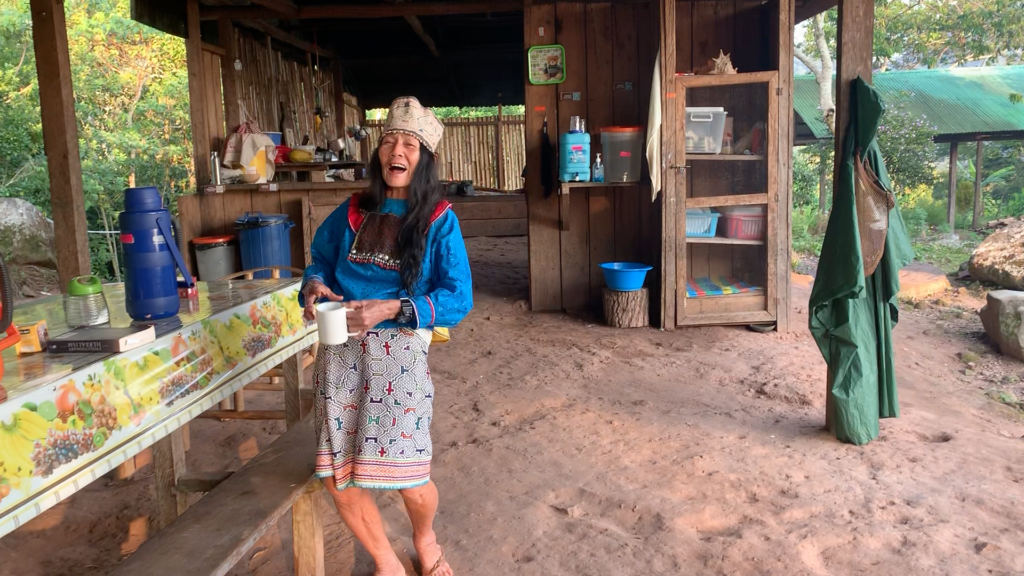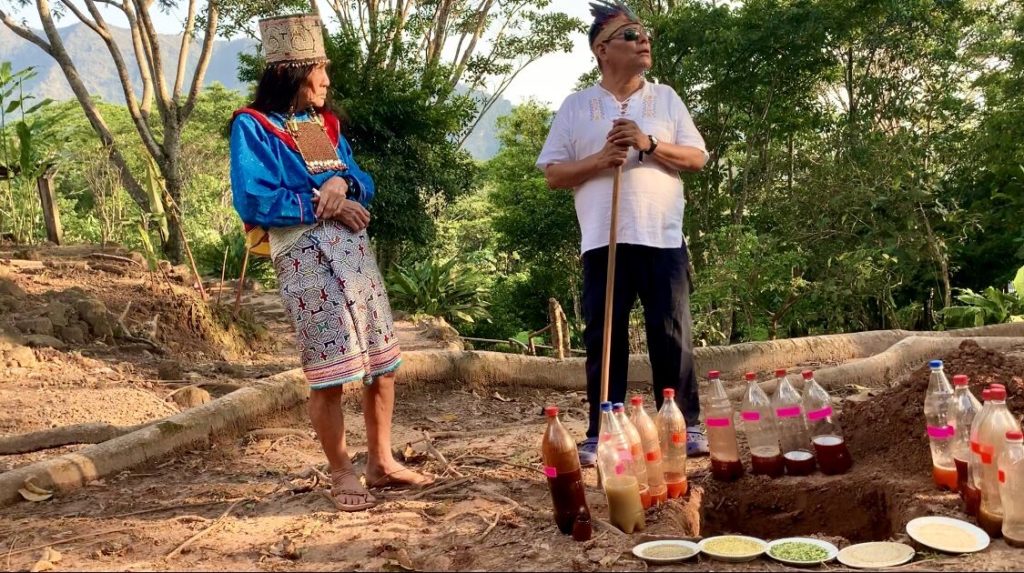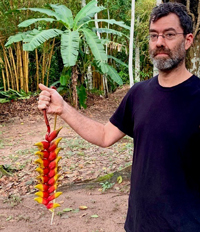
AFTER A HALF-DAY’S CLIMB, scrambling across rivers and around muddy ledges, we came to a clearing. The density of the high jungle gave way to a mountainside covered in butter-green clover. A path of large mossy stones snaked up through blooming medicinal plants. At the top, a house of nailed boards and corrugated iron; in the background, verdant peaks enswathed in clouds of mist.
We had come here to the eastern Andes, high in the Alta Shilcayo National Park, to work and study with Miguel Tapullima, the hearty fifty-two-year-old in high rubber boots and dark glasses who now surveyed the grounds, made sure all was right in his family redoubt. A Quechua curandero from a long line of Quechua curanderos, Miguel’s father and grandfather made the steep climb to this isolated medicinal garden until both literally dropped dead on the slope.
People came to him for all sorts of reasons. Some hoped his pharmacopeia would cure their addictions or auto-immune disorders or migraines. Others wanted to experience the local psychedelics, hoping to exorcise trauma or see something new.
Our group consisted of six New Yorkers. Three were already Miguel’s students: a psychotherapist, a psychology grad student, and an ex-Marine now working as a firefighter in Canarsie. Three were newcomers: a molecular biologist from a stem cell lab on the Upper East Side, the creative director of a downtown ad agency, and me.
We arrived on a Tuesday in early March, planning to stay ten days.
Miguel assigned us each an isolated hut, and we scattered to drop off our stuff before gathering back at the main house. We had our first meal of what would be our sustenance up here—grains and lentils with no salt.
My hut was ten minutes’ walk into the jungle under a massive yanchama tree, a complex interwoven structure of twisted roots and vines. Everything around it was humid, mossy, crawling with insects, pulsing and bleating with birds and frogs.
After observing and talking to us for a day and a half, Miguel prescribed each of us a medicinal plant. He assigned me the semi-fermented bark of bobinsana, a squat tree that grows near river rapids. Its strong roots withstand the vicissitudes of the rainforest currents, and eventually it explodes with blooms of fine, pink-white threads. Miguel explained that it was a feminine plant, that it had a cooling effect, that its mother was the hummingbird, and that it was related to the mermaid.
When bobinsana loves you, he laughed, a mermaid comes and sweeps you away.
The mildly effervescent brew knocked me out. After the first cup, I collapsed in a languid blear. From then on, I drank cupfuls twice a day.
There was no electricity, and though some of our phones were still charged, there was rarely a signal. Still, we knew the pandemic was advancing. We knew we would go down the mountain to new and uncertain conditions. But for now we lived there among the tarantulas, scorpions, bats, hummingbirds, and yellow-winged caciques. Sometimes we heard a yelp like a dog in pain, which we learned was the call of a toucan.
Every second night we sat amid clouds of ritual tobacco in a circular structure called a maloka and drank regional psychedelics: ayahuasca vine and chacruna leaf mixed with other ingredients—musical piri piri, perhaps, or ayahuma, a plant that draws out fears, also called cabeza de muerte.
Miguel had invited Sarela Cupertino to assist him, a Shipibo curandera from Pucallpa, a day’s travel away. Mostly, she could be found teasing, flirting, smoking by the kitchen. Then, on ceremony nights, she put on her shiny, blue, embroidered jersey and white cotton crown. Waist-length hair framed her exquisitely lined face.

Miguel and Sarela took turns singing through the hours-long ceremonies. Miguel’s nasal tenor, verging on laughter, reined in our attention. Sarela’s high piercing tone drilled into the mind, then dropped to a low and rhythmic moan. I was not the only one who imagined Sarela singing at the end of time.
Those long nights were rampant with visions. I felt the cycling nature of vigilant consciousness, its relentlessness, until I could only utter crazed laughter at the edge of a sob. There were times I maintained a crystal focus through all the turbulence, when the ceremony felt like a delicate refining of attention. Or I took a break, walked outside to piss and stare at the endless march of leaf-carrying ants, watch electrical storms over the valley, or smoke rough local tobacco on a bench beneath the ojé tree. At one point I sat speaking Serbian with our molecular biologist—a Hungarian from Vojvodina—and that was as mind-bending as anything.
On the seventh night, after many hours, Miguel ended the ceremony and propped himself against the wall of the maloka. He’d been disturbed by the night’s visions.
Chucha, he said. This corona virus is like the plague from the Bible.
The next afternoon, a park ranger in khaki shorts appeared. He said soldiers had sealed the entrance to the park. No one could enter.
We checked the news. Peru had declared a state of emergency: all domestic travel halted, the borders sealed. We checked our flights, scheduled to leave in a few days. All cancelled.
Chucha, Miguel said.
We rebooked for the end of March, but those flights were cancelled a few days later.
This is not going to end soon, the molecular biologist said. The US is doing everything wrong. It’s going to get much worse.
The firefighter’s boss asked if he couldn’t get on a military plane, but we were a thirty-hour bus ride from Lima, not to mention a half day’s walk to the nearest dirt road. No one was going to come for us.
We had worried about spiders and poisonous snakes, and hoped for transformation and insights. Now we were faced with an indefinite military lockdown in an unknown town. Beyond that lay a new world that no one understood.
We pushed Miguel to let us stay a few more days, but eventually we had to go down. We needed internet. We had to work. Miguel called a friend who ran a lodge at the bottom of the hill, and she agreed to put us up.
The next morning we ate tomatoes with a few slices of onion with salt—our first taste of salt in 16 days—then descended the steep slope to the valley.
The lodge was a pleasant place along a small river overrun with black tamarin monkeys. The manager was a Romanian woman Miguel had cured of a rare bone disease some years before. Intending to stay a month, she’d changed her life, fallen in love, made a home here.
The state of emergency was extended two weeks, then again. There was no way to know when it would end.
Reports from New York were worse by the day. Friends and neighbors had the virus. People were dying. My doctor friend sent harrowing reports from his emergency room in Brooklyn. And the US, with its vile leader and his throngs of supporters, with all the lies and systemic rot boiling over, seemed like the most unfortunate, backward place in the world.
Of the six of us, two are non-citizens, one on a work visa expiring in a few months. Now the president decreed that immigration services, already defunded and skeletonized, would be halted. For two months, but who could say that wouldn’t be prolonged? Universities closed, offices closed, firefighters falling ill at alarming rates. Why would we want to go back there? Here we had fresh fruit, a garden to walk around in.
Perhaps this is a time, the ad agent said, when your life takes a turn, and that’s it.
After a few weeks, Miguel came to see us. There was a maloka up the road from our lodge, and he wanted to hold a ceremony.
We gathered on a Tuesday night. The mood was solemn.
A lot of people have nowhere to go, Miguel said. Can’t even get to the river to bathe. People have thrown up the white flag.
We drank wooden shotglasses of his psychedelic brew—cabeza de muerte.
Sarela doubled over in pain and couldn’t sing. Our heads spun. Even Miguel was knocked off balance by the brew. He did his best to keep us focused, but then had to step outside, take a moment to breathe.
It’s ending, he said. This world is ending.
By the end of the night, though, despite everything, his laughter had returned. It wasn’t clear why. Would all this evaporate—poof!—like a momentary vision?

* * *
All that was written in early April, before outrage over the recent murders of Breonna Taylor and Ahmaud Arbery joined with fresh outrage over the murder of George Floyd, the protests, and brutal police response. We are still in our lodge by the river; having created a little family here, working as best we can, cooking together, and taking turns going to the market in town. But in recent days we’ve been obsessively scanning the news, checking in with friends, and sending money as the US convulses. I’ve marched many times over the past few years, and I can’t help but be consumed with what’s to come, swinging wildly from dystopian to utopian.
But even with the protests swelling, New York reopening, and the virus advancing in Peru, I continue to feel lucky to be quarantined here. There has hardly been a choice. The state of emergency remains in place. We’re still several days’ travel, requiring special government permission, from the military airport outside Lima where expensive repatriation flights depart. A few days ago, we heard international commercial travel likely won’t start up until October.
With that in mind, this chapter of life in our riverside lodge comes to a close. We spoke to Miguel and Sarela and arranged to head back up into the mountains. In a few days we’ll be alone again in our distant huts, without electricity or salt, getting our news from other sources.

Brad Fox is a writer from New York presently quarantined in Peru. His novel To Remain Nameless was released by Rescue Press this May. His work has appeared in The New Yorker, Guernica, and in the Whitney Biennial. Find him at bradfox.org.
Photographs by Eszter Domjan






